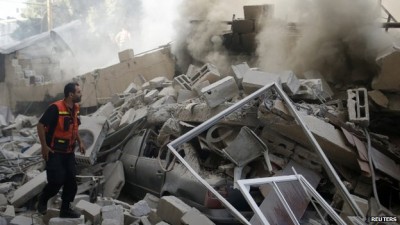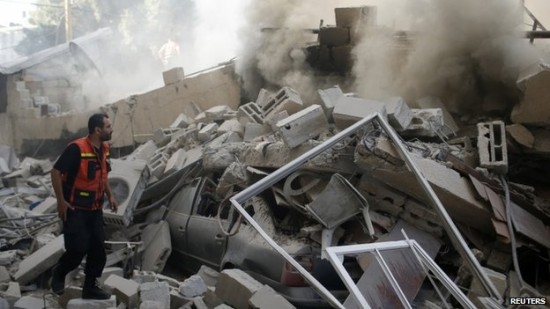
By Gideon Rachman
When last week I saw a White House spokesman say that Israel’s bombing of a UN school was “totally indefensible”, I briefly thought that I had witnessed something new. Surely the Americans had never before been that strong in condemning Israel? But a colleague with a longer memory reminded me that Israel’s siege of west Beirut in 1982 had provoked President Ronald Reagan (yes, Reagan) to telephone Menachem Begin, the Israeli prime minister, and accuse him of perpetrating a “holocaust”. There is nothing new about Israeli military action killing hundreds of civilians. There is also nothing new about the international outcry it provokes.
In the 32 years since Reagan called Begin, the Berlin Wall has fallen, the Soviet Union has collapsed, China has been transformed, apartheid has ended and the internet has revolutionised communication. But the Israeli-Palestinian conflict has rolled ever onwards – with two intifadas, three invasions of Gaza, further wars in Lebanon and innumerable failed peace initiatives.
While the Israelis and the Palestinians remain locked in bloody conflict, however, the region around them is changing fast. For the moment, those changes are actually making Israel less vulnerable to international condemnation. In the longer term, shifts in global power suggest that Israel’s future will be bleak, particularly if it does not make peace with the Palestinians.
For now, Israel is benefiting from the fact that the Arab world, which has acted as the chief advocate for the Palestinians in previous conflicts, is ripping itself apart. Syria and Iraq are engulfed by conflict, and Libya is in turmoil. The Egyptian government itself has killed hundreds of supporters of the Muslim Brotherhood in Cairo and regards Hamas as an offshoot of the Brotherhood. Saudi Arabia, the other big power in the Arab world, is also deeply hostile to Hamas.
Outside the region, geopolitical shifts are taking the edge off the anti-Israel backlash. The governments of Russia, India and China are deeply concerned about the threat of radical Islam at home. Last week more than 100 people were killed in the Chinese province of Xinjiang, after fighting provoked by Muslim separatists. Russia also has 20m Muslim citizens and, after waging two brutal wars in Chechnya, is paranoid about Islamist militancy. Narendra Modi, India’s prime minister, is a Hindu nationalist, who himself is accused of connivance in anti-Muslim violence.
These political shifts are not reflected in official diplomacy. China, Russia and India voted in favour of an investigation of possible Israeli war crimes in Gaza, at the recent session of the UN Human Rights council. (EU countries abstained and the US voted against.) But there is something formulaic about the condemnation. An Israeli official says that in high-level meetings between Israeli and Chinese leaders, the Chinese spent “roughly 20 seconds” on Palestine. Benjamin Netanyahu, the Israeli prime minister, and President Vladimir Putin of Russia get on famously.
Yet while Israel’s traditional enemies are becoming less hostile, its allies are becoming less friendly. The relationship between Mr Netanyahu and US President Barack Obama is chilly – and some Israeli officials are openly contemptuous of John Kerry, the US secretary of state. Opinion polls in the US also suggest that young people are much less sympathetic to Israel than older groups are. However, such shifts may take decades to filter through into US policy. Israel’s position in Washington is deeply entrenched. The US Senate voted unanimously to support the Gaza assault and the Obama administration has combined its condemnation of Israeli actions with continued aid and arms sales.
Many European leaders are openly appalled by Israel’s actions in Gaza and Europe’s large Muslim population has been at the forefront of anti-Israel demonstrations. But Europe’s Muslims are an often marginalised and unpopular group. Manuel Valls, the French prime minister, has condemned anti-Semitic demonstrations which he says have fused the “Palestinian cause, jihadism, the detestation of Israel and the hatred of France”. Any such fusion helps Israel because it reduces sympathy for the Palestinians.
Israel has long been concerned about the possibility of
EU sanctions. But the measures under discussion, for example banning imports from illegal Israeli settlements, would be largely symbolic in their impact. Surveying this global picture, Israel seems to have decided that it can afford to ignore international condemnation of the Gaza war. That calculation may prove correct, as far as the current conflict is concerned.
But the political shifts that are now helping Israel look much more ominous in the long run. Turmoil in the Arab world may briefly have produced a constellation of forces that is helpful to Israel. But that situation could easily change. And some of the rising forces in the region – most obviously Isis in Iraq – make Hamas look moderate.
More broadly, a relative decline in US power is bad news for a country that is, in cultural terms, an outpost of the west. America’s willingness to entangle itself in Middle Eastern conflicts is declining. That means that, long term, Israel’s security can only be guaranteed by achieving peace with its neighbours. Reducing Gaza to rubble and killing hundreds of civilians every few years makes that prospect ever more distant.
But a security-obsessed Israeli government, backed by an ever more rightwing public, seems to have given up thinking about the long term.
Financial Times


Leave a Reply
You must be logged in to post a comment.